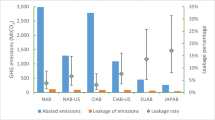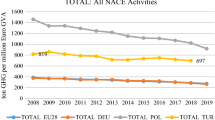Abstract
Since the signing of the Kyoto Protocol in December 1997, several studies have estimated the costs of reducing greenhouse gas emissions by the amount specified in the Protocol, as well as the price of the permits. A number of authors have recently shown that, following the US withdrawal and the Bonn and Marrakesh agreements, these abatement costs will be very low and the price of the permits could reach zero. However, these analyses usually take only the first commitment period (2008–2012) into account and do not explicitly consider the possibility of banking permits from one commitment period to the other (Art. 3.13 of the Protocol). The simple dynamic model that we develop here introduces this possibility. It allows one to analyze the impact of alternative future commitments for the US and the non-Annex B countries on world emissions, abatement costs, and the permit price. We find that, provided ambituous post-Kyoto commitments are negotiated: (1) in 2008–2012, the number of banked permits will largely exceed the amount of hot air and permit prices will be much higher than predicted by most other studies, (2) the banking provision significantly reduces world total costs but increases total costs for all permit-importing Annex B countries (i.e., all Annex B countries except those of eastern Europe) via a rise in the permit price in 2008–2017, and (3) the issue of market power on hot air is not likely to be relevant.
Similar content being viewed by others
References
Blanchard O, Criqui P, Trommetter M, Viguier L (2000) Audelà de Kyoto: enjeux d’équité et d’efficacité dans la négociation sur le changement climatique. Economie et Prévision 143–144:15–35
Blanchard O, Criqui P, Kitous A (2002) Après La Haye, Bonn et Marrakech: le futur marché international des permis de droits d’émissions et la question de l’air chaud. Cahier de Recherches 27, Institut d’Economie et de Politique de l’Energie (IEPE), Grenoble, January 2002
Böhringer C (2001) Climate politics from Kyoto to Bonn: from little to nothing? Discussion Paper No. 01-49, Center for European Economic Research (ZEW), Mannheim
Buchner B, Carraro C, Cersosimo I (2001) On the consequences of the U.S. withdrawal from the Kyoto/Bonn Protocol. Nota Di Lavoro 102.2001, Fondazione Eni Enrico Mattei, December 2001
Capros P, Georgakopoulos P, Van Regemorter D, Proost S, Schmidt T, Koschel H, Conrad K, Vouyoukas E (1999) Climate technologies strategies 2, the macroeconomic cost and benefit of reducing greenhouse gas emissions in the European Union. ZEW Economic Studies 4, ZEW, Mannheim
Carzola M, Toman M (2000) International equity and climate change policy. Climate Issue Brief No. 27, Resources for the Future (RFF), December 2000
Ciorba U, Lanza A, Pauli F (2001) Kyoto Protocol and emission trading: does the US make a difference? Nota Di Lavoro 90.2001, Fondazione Eni Enrico Mattei, December 2001
Cronshaw M, Kruse J (1996) Regulated firms in pollution permit markets with banking. Journal of Regulatory Economics 9:179–189
Edmonds J, Wise M, Barns D (1995) Carbon coalitions: the cost and effectiveness of energy agreements to alter trajectories of atmospheric carbon dioxide emissions. Energy Policy 23:309–335
Ellerman D (2002) Analysis of the Bush proposal to reduce the S02 cap. Working Paper 02-002, Center for Energy and Environmental Policy Research, Massachusetts Institute of Technology, February 2002
den Elzen M, de Moor A (2001a) Evaluating the Bonn Agreement and some key issues. National Institute of Public Health and the Environment (RIVM), Bilthoven, the Netherlands
den Elzen M, de Moor A (2001b) The Bonn Agreement and Marrakesh Accords: an updated analysis. National Institute of Public Health and the 34 Environment (RIVM), Bilthoven, the Netherlands
den Elzen M, Berk M, Shaeffer M, Olivier J, Hendriks C, Metz B (1999) The Brazilian proposal and other options for international burden sharing: an evaluation of methodological and policy aspects using the FAIR model. RIVM Report No. 728001011, National Institute of Public Health and the Environment (RIVM), Bilthoven, the Netherlands
Eyckmans J, Cornillie J (2002) Supplementarity in the European carbon emission market. In: Albrecht J (ed) Instruments for climate policy: limited versus unlimited flexibility. Edward Elgar, Cheltenham, UK
Eyckmans J, Van Regemorter D, van Steenberghe V (2001) Is Kyoto fatally flawed? An analysis with MacGEM. CLIMNEG/CLIMBEL Working Paper No. 48, Center for Operations Research and Econometrics (CORE), Université Catholique de Louvain, November 2001
Hagem C, Holtsmark B (2001) From small to insignificant: climate impact of the Kyoto Protocol with and without US. Policy Note 2001:1, Center for International Climate and Environmental Research (CICERO), Oslo, June 2001
Hagem C, Westskog H (1998) The design of a dynamic tradable quota system under market imperfections. Journal of Environmental Economics and Management 36:89–107
Hourcade JC, Ghersi F (2002) The economics of a lost deal: Kyoto—The Hague—Marrakesh. The Energy Journal 23:1–26
IPCC (Intergovernmental Panel on Climate Change) (1996) Climate change 1995—economic and social dimensions of climate change. Contribution of Working Group III to the Second Assessment Report of the Intergovernmental Panel on Climate Change, Cambridge University Press, Cambridge
IPCC (Intergovernmental Panel on Climate Change) (2000) Emissions scenarios. Special Report of the Intergovernmental Panel on Climate Change, Cambridge University Press, Cambridge
Kling C, Rubin J (1997) Bankable permits for the control of environmental pollution. Journal of Public Economics 64:101–115
Kverndokk S (1995) Tradeable CO2 emission permits: initial distribution as a justice problem. Environmental Values 4:129–148
Löschel A, Zhang Z (2002) The economic and environmental implications of the US repudiation of the Kyoto Protocol and the subsequent deals in Bonn and Marrakech. Nota Di Lavoro 23.2002, Fondazione Eni Enrico Mattei, April 2002
Manne A, Richels R (2001) US rejection of the Kyoto Protocol: the Impact on compliance costs and CO2 emissions. Working Paper 01-12, AEI-Brookings Joint Center for Regulatory Studies, October 2001
Rose A (1992) Equity considerations of tradeable carbon entitlements. In: Barret S, Grubb M, Roland K, Rose A, Sandor R, Tietenberg T (eds) Combatting global warming: a global system of tradeable carbon emission entitlements. UNCTAD, Genève
Rose A, Kverndokk S (1998) Equity in environmental policy: an application to global warming. In: van den Berg J (ed) Handbook on environmental and resource economics. Edward Elgar, Cheltenham, UK
Rose A, Stevens B, Edmonds J, Wise M (1998) International equity and differentiation in global warming policy. Environmental and Resource Economics 12:25–51
Rubin J (1996) A model of intertemporal emission trading, banking and borrowing. Journal of Environmental Economics and Management 31:269–286
Schennach S (2000) The economics of pollution permit banking in the context of Title IV of the 1990 Clean Air Act Amendments. Journal of Environmental Economics and Management 40:189–210
Torvanger A, Godal O (1999) A survey of differentiation methods for national greenhouse gas reduction targets. Report 1999:5, Center for International Climate and Environmental Research (CICERO), Oslo, August 1999
UNFCCC (United Nations Framework Convention on Climate Change) (1998) Report of the conference of the parties on its third session, Kyoto, 1-11 December, FCCC/CP/7/Add.l 18 March 1998
UNFCCC (United Nations Framework Convention on Climate Change) (2001 a) Implementation of the Buenos Aires Plan of Action, Decision 5/CP.6*, FCCC/CP/2001/L.7
UNFCCC (United Nations Framework Convention on Climate Change) (2001 a) Report of the conference of the parties on its seventh session, held at Marrakesh from 29 October to 10 November 2001, FCCC/CP/2001/13
Viguier L (2002) The US climate change policy: a preliminary evaluation. Policy Brief No. 1, Le Centre Français sur les Etats-Unis (CFE), Institut Français des Relations Internationales (IFRI), Paris, March 2002
Yates A, Cronshaw M (2001) Pollution permit markets with intertemporal trading and asymmetric information. Journal of Environmental Economics and Management 42:104–118
Author information
Authors and Affiliations
About this article
Cite this article
van Steenberghe, V. Carbon dioxide abatement costs and permit price: exploring the impact of banking and the role of future commitments. Environ Econ Policy Stud 7, 75–107 (2005). https://doi.org/10.1007/BF03353946
Received:
Accepted:
Published:
Issue Date:
DOI: https://doi.org/10.1007/BF03353946




